łatgalski
Zarys sytuacji socjolingwistycznej
Łatgalski wśród innych języków w Łatgalii
Łatgalia jest obszarem naturalnie wielojęzycznym. Prawdopodobnie nie ma jednojęzycznych (=monolingwalnych) użytkowników języka łatgalskiego. W większości są oni trójjęzyczni – oprócz łatgalskiego i łotewskiego posługują się językiem rosyjskim (Nau 2011: 4 Nau 2011 / komentarz/comment/r /
Nau 2011 / komentarz/comment/r / Nau, Nicole 2011. A short grammar of Latgalian. München: Lincom Europa.
 ).
).W przeszłości językiem kontaktów pomiędzy społecznościami językowymi mieszkańców Łatgalii był język polski, a bilingwizm w konfiguracji łotewski/łatgalski (+ rosyjski) pojawił się dopiero w XX w., kiedy Łotwa uzyskała niepodległość (Čekmonas 2001: 130
 Čekmonas 2001 / komentarz/comment/r /
Čekmonas 2001 / komentarz/comment/r / Čekmonas, Valeriy 2001. „Russian varieties in the southeastern Baltic area: Rural dialects”, w: Ö. Dahl & M. Koptjevskaja-Tamm (red.). Circum-Baltic Languages. vol.1. Past and Present. Amsterdam: Benjamins. 101–136.
 ). Już pod koniec XIX w. wielu Łatgalów mówiło po rosyjsku: był to jedyny język używany w szkołach 1865-1904; młodzież kontynuowała wykształcenie na rosyjskich uniwersytetach. Znaczenie rosyjskiego zmalało w latach międzywojennych, by ponownie wzrosnąć w czasach sowieckich.
). Już pod koniec XIX w. wielu Łatgalów mówiło po rosyjsku: był to jedyny język używany w szkołach 1865-1904; młodzież kontynuowała wykształcenie na rosyjskich uniwersytetach. Znaczenie rosyjskiego zmalało w latach międzywojennych, by ponownie wzrosnąć w czasach sowieckich. Większość Łatgalów to potomkowie warstwy chłopskiej, której, w przeciwieństwie do np. posiadaczy ziemskich, w zbyt dużym stopniu nie dotknęła ani germanizacja, ani polonizacja (Jankowiak 2010: 52
 Jankowiak 2010 / komentarz/comment/r /
Jankowiak 2010 / komentarz/comment/r / Jankowiak, Mirosław 2010. „Wielonarodowość i wielokulturowość Łatgalii w aspekcie społecznym i historycznym”, w: J. Mędelska & Z, Sawaniewska-Mochowa (red.) Językowe i kulturowe dziedzictwo Wielkiego Księstwa Litewskiego. Księga jubileuszowa na 1000-lecie Litwy. Bydgoszcz: UKW.
 ). Dziesiątki lat celowej polityki rusyfikacyjnej najpierw władz carskich, a potem sowieckich przyniosły jednak zgoła inny skutek. Na chwilę obecną rosyjski obecny jest we wszystkich sferach życia i, mimo polityki letonizacyjnej łotewskich władz, utrzymuje status najważniejszego języka w Łatgalii (Jankowiak 2010: 53
). Dziesiątki lat celowej polityki rusyfikacyjnej najpierw władz carskich, a potem sowieckich przyniosły jednak zgoła inny skutek. Na chwilę obecną rosyjski obecny jest we wszystkich sferach życia i, mimo polityki letonizacyjnej łotewskich władz, utrzymuje status najważniejszego języka w Łatgalii (Jankowiak 2010: 53 Jankowiak 2010 / komentarz/comment/r /
Jankowiak 2010 / komentarz/comment/r / Jankowiak, Mirosław 2010. „Wielonarodowość i wielokulturowość Łatgalii w aspekcie społecznym i historycznym”, w: J. Mędelska & Z, Sawaniewska-Mochowa (red.) Językowe i kulturowe dziedzictwo Wielkiego Księstwa Litewskiego. Księga jubileuszowa na 1000-lecie Litwy. Bydgoszcz: UKW.
 ). Jest też jedynym językiem, który rozumieją wszyscy jej mieszkańcy (Jankowiak 2009: 229
). Jest też jedynym językiem, który rozumieją wszyscy jej mieszkańcy (Jankowiak 2009: 229 Jankowiak 2009 / komentarz/comment/r /
Jankowiak 2009 / komentarz/comment/r / Jankowiak, Mirosław 2009. Gwary białoruskie na Łotwie w rejonie krasławskim. Studium socjolingwistyczne. Warszawa: Slawistyczny Ośrodek Wydawniczy.
 ).
).W południowej Łatgalii językiem kontaktów sąsiedzkich są różne odmiany języka białoruskiego. Gwary białoruskie i tzw. mowa prosta to najbardziej naturalne odmiany używane do kontaktów przez wszystkich słowiańskojęzycznych mieszkańców południa regionu (Jankowiak 2010: 53
 Jankowiak 2010 / komentarz/comment/r /
Jankowiak 2010 / komentarz/comment/r / Jankowiak, Mirosław 2010. „Wielonarodowość i wielokulturowość Łatgalii w aspekcie społecznym i historycznym”, w: J. Mędelska & Z, Sawaniewska-Mochowa (red.) Językowe i kulturowe dziedzictwo Wielkiego Księstwa Litewskiego. Księga jubileuszowa na 1000-lecie Litwy. Bydgoszcz: UKW.
 ).
).Status języka łatgalskiego na Łotwie
W XVIII i XIX wieku łatgalski i łotewski były w mowie dialektami wzajemnie dla siebie zrozumiałymi, ale ich standardy pisane już nie. Literatury tych języków rozwijały się osobno (Nau 2011: 5 Nau 2011 / komentarz/comment/r /
Nau 2011 / komentarz/comment/r / Nau, Nicole 2011. A short grammar of Latgalian. München: Lincom Europa.
 ). Druga połowa XIX wieku przyniosła przymusową rusyfikację, a w 1865 r. wprowadzono zakaz wydawania tekstów zapisywanych pismem łacińskim. Próby zapisu języka łatgalskiego cyrylicą kończyły się niepowodzeniami, gdyż alfabet ten kojarzony był z prawosławiem i jego użycie było dla katolickich Łatgalów niedopuszczalne. Do 1904 r. trwało więc masowo ręczne kopiowanie tekstów po łatgalsku. Przeznaczone one były głównie do użytku domowego (Nau 2011: 5
). Druga połowa XIX wieku przyniosła przymusową rusyfikację, a w 1865 r. wprowadzono zakaz wydawania tekstów zapisywanych pismem łacińskim. Próby zapisu języka łatgalskiego cyrylicą kończyły się niepowodzeniami, gdyż alfabet ten kojarzony był z prawosławiem i jego użycie było dla katolickich Łatgalów niedopuszczalne. Do 1904 r. trwało więc masowo ręczne kopiowanie tekstów po łatgalsku. Przeznaczone one były głównie do użytku domowego (Nau 2011: 5 Nau 2011 / komentarz/comment/r /
Nau 2011 / komentarz/comment/r / Nau, Nicole 2011. A short grammar of Latgalian. München: Lincom Europa.
 ).
).XX wiek to czas przebudzenia tożsamościowego Łatgalów; teksty które powstawały w tym czasie po łatgalsku były już pisane przez osoby, dla których był to pierwszy język. Po odzyskaniu prze Łotwę niepodległości łatgalski był używany w szkołach i administracji publicznej i traktowany jako jeden ze sposobów używania języka łotewskiego. Od lat 1930-tych status łatgalskiego zmieniał się dość znacznie w krótkich odstępach. Za czasów autorytarnej władzy ostatniego przed II wojną światową prezydenta Kārlisa Ulmanisa na Łotwie panowała ideologia jednego narodu i jednego języka, a łatgalski cieszył się wówczas dużo większym prestiżem w Rosji Radzieckiej, gdzie miał status języka narodowości (=mniejszości narodowej) i był nauczany w szkołach (Nau 2011: 6
 Nau 2011 / komentarz/comment/r /
Nau 2011 / komentarz/comment/r / Nau, Nicole 2011. A short grammar of Latgalian. München: Lincom Europa.
 ). Polityka okupantów niemieckich względem Łatgalów i łatgalskiego była przychylna, jednak wynikało to z chęci przypodobania się ludności zamieszkującej strategiczne militarnie tereny. Po II wojnie światowej większość działań na rzecz łatgalskiego była prowadzona poza granicami ZSRR. Oficjalnie polityka władz radzieckich nie była wobec języka łatgalskiego nieprzychylna, jednak nie zyskiwał on żadnego wsparcia, a jego użycie w życiu publicznym było raczej źle widziane. W czasach Łotwy radzieckiej wydawnictwa w języku łatgalskim pojawiały się sporadycznie do połowy lat 1960-tych oraz ponownie zaczęły się ukazywać na kilka lat przed upadkiem komunizmu. W czasach Łotwy radzieckiej w Monachium działało łatgalskie wydawnictwo Latgaļu Izdevnīceiba (Latgalian Publishing Co. / Latgalischer Verlag).
). Polityka okupantów niemieckich względem Łatgalów i łatgalskiego była przychylna, jednak wynikało to z chęci przypodobania się ludności zamieszkującej strategiczne militarnie tereny. Po II wojnie światowej większość działań na rzecz łatgalskiego była prowadzona poza granicami ZSRR. Oficjalnie polityka władz radzieckich nie była wobec języka łatgalskiego nieprzychylna, jednak nie zyskiwał on żadnego wsparcia, a jego użycie w życiu publicznym było raczej źle widziane. W czasach Łotwy radzieckiej wydawnictwa w języku łatgalskim pojawiały się sporadycznie do połowy lat 1960-tych oraz ponownie zaczęły się ukazywać na kilka lat przed upadkiem komunizmu. W czasach Łotwy radzieckiej w Monachium działało łatgalskie wydawnictwo Latgaļu Izdevnīceiba (Latgalian Publishing Co. / Latgalischer Verlag).Obecna sytuacja łatgalskiego jest o tyle ciekawa, że w ogólnołotewskich debatach publicznych i w dyskursie socjolingwistycznym dominuje kwestia statusu przede wszystkim dwu języków: łotewskiego i rosyjskiego. Dyskusja publiczna nad kwestiami językowymi na Łotwie zdaje się być zdominowana z jednej strony przez oficjalną politykę państwa skierowaną na „przywrócenie” języka łotewskiego, który w czasach postsowieckich miałby pełnić rolę pierwszego i dominującego języka w tym kraju, a z drugiej przez bardzo skądinąd liczną mniejszość rosyjskojęzyczną, która nieustannie domaga się rosyjskiego jako pełnoprawnego języka życia publicznego. Łatgalski ciągle znajduje się na marginesie wszelkich dyskusji nad sytuacją językową na Łotwie, choć, jeśli uznawać go za odrębny od łotewskiego, jest przecież trzecim pod względem liczby użytkowników językiem na Łotwie. W wymiarze regionalnym, język łatgalski wywołuje dość żywe emocje i pełni rolę jednego z ważniejszych wyznaczników tożsamości Łatgalów. Elita akademicka i polityczna Łotwy skupiona jest jednak w Rydze i na Rydze, czyli przede wszystkim na sprawach stolicy, gdzie obok Łotyszy dużą grupę językową stanowią Rosjanie (Lazdiņa & Marten 2012: 66–67
 Lazdiņa & Marten 2012 / komentarz/comment/r /
Lazdiņa & Marten 2012 / komentarz/comment/r / Lazdiņa, Sanita & Heiko F. Marten 2012. ”Latgalian in Latvia. A Continuous Struggle for Political Recognition”, Journal of Ethnopolitics and Minority Issues in Europe 11: 66–87.
 ). Z drugiej strony, łatgalski jest jednym z trzech, obok łotewskiego i liwskiego, języków wymienionych w łotewskiej konstytucji (Lazdiņa & Marten 2012: 68
). Z drugiej strony, łatgalski jest jednym z trzech, obok łotewskiego i liwskiego, języków wymienionych w łotewskiej konstytucji (Lazdiņa & Marten 2012: 68 Lazdiņa & Marten 2012 / komentarz/comment/r /
Lazdiņa & Marten 2012 / komentarz/comment/r / Lazdiņa, Sanita & Heiko F. Marten 2012. ”Latgalian in Latvia. A Continuous Struggle for Political Recognition”, Journal of Ethnopolitics and Minority Issues in Europe 11: 66–87.
 ), choć jedynie jako prawnie chroniony historyczny wariant łotewskiego języka pisanego. Łotewska Ustawa o języku państwowym (Valsts valodas likums) uznaje dialekty łatgalskie jako podgrupę dialektów górnołotewskich, a pisany jako „historyczną odmianę łotewskiego” (Nau 2011: 4
), choć jedynie jako prawnie chroniony historyczny wariant łotewskiego języka pisanego. Łotewska Ustawa o języku państwowym (Valsts valodas likums) uznaje dialekty łatgalskie jako podgrupę dialektów górnołotewskich, a pisany jako „historyczną odmianę łotewskiego” (Nau 2011: 4 Nau 2011 / komentarz/comment/r /
Nau 2011 / komentarz/comment/r / Nau, Nicole 2011. A short grammar of Latgalian. München: Lincom Europa.
 ).
).Wśród językoznawców trwa dyskusja o status łatgalskiego jako języka bądź dialektu. Z punktu widzenia dialektologii, łatgalski stanowi grupę dialektów należącą do dialektów górnołotewskich (Balode & Holvoet 2001
 Balode & Holvoet 2001 / komentarz/comment/r /
Balode & Holvoet 2001 / komentarz/comment/r / Balode, Laimute & Axel Holvoet 2001. „The Latvian language and its dialects”, w: Ö. Dahl & M. Koptjevskaja-Tamm (red.) Circum-Baltic Languages. vol.1. Past and Present. Amsterdam: Benjamins. 3–40.
 ), która dzieli się wewnętrznie na dialekty północne, środkowo-wschodnie i południowe (Nau 2011: 4
), która dzieli się wewnętrznie na dialekty północne, środkowo-wschodnie i południowe (Nau 2011: 4 Nau 2011 / komentarz/comment/r /
Nau 2011 / komentarz/comment/r / Nau, Nicole 2011. A short grammar of Latgalian. München: Lincom Europa.
 ). Lingwistycznie nie ma uzasadnienia twierdzenie, jakoby łatgalski miał być językiem-kontynuatorem średniowiecznych dialektów Bałtów zamieszkujących Łatgalię. W warstwie fonetycznej różni się on od innych dialektów łotewskich, ale obecność cech różnicujących nie jest wynikiem osobnego rozwoju języka, a stawiane za argument mający przemawiać za językową odrębnością łatgalskiego archaizmy w warstwie leksykalnej można znaleźć także w języku kurlandzkim (Balode & Holvoet 2001: 8
). Lingwistycznie nie ma uzasadnienia twierdzenie, jakoby łatgalski miał być językiem-kontynuatorem średniowiecznych dialektów Bałtów zamieszkujących Łatgalię. W warstwie fonetycznej różni się on od innych dialektów łotewskich, ale obecność cech różnicujących nie jest wynikiem osobnego rozwoju języka, a stawiane za argument mający przemawiać za językową odrębnością łatgalskiego archaizmy w warstwie leksykalnej można znaleźć także w języku kurlandzkim (Balode & Holvoet 2001: 8 Balode & Holvoet 2001 / komentarz/comment/r /
Balode & Holvoet 2001 / komentarz/comment/r / Balode, Laimute & Axel Holvoet 2001. „The Latvian language and its dialects”, w: Ö. Dahl & M. Koptjevskaja-Tamm (red.) Circum-Baltic Languages. vol.1. Past and Present. Amsterdam: Benjamins. 3–40.
 ).
). Choć dialektologiczne język łatgalski uznawany jest za dialekt języka łotewskiego, w aspekcie makrojęzykowym łatgalski spełnia kryteria, które pozwalałyby go zaklasyfikować jako odrębny język ma stosunkowo długą tradycję piśmiennictwa, a spora część użytkowników łotewskiego ma problemy ze zrozumieniem osób mówiących po łatgalsku (Lazdiņa & Marten 2012: 68
 Lazdiņa & Marten 2012 / komentarz/comment/r /
Lazdiņa & Marten 2012 / komentarz/comment/r / Lazdiņa, Sanita & Heiko F. Marten 2012. ”Latgalian in Latvia. A Continuous Struggle for Political Recognition”, Journal of Ethnopolitics and Minority Issues in Europe 11: 66–87.
 ). Wreszcie, sami Łatgalowie uważają łatgalski za odrębny język.
). Wreszcie, sami Łatgalowie uważają łatgalski za odrębny język. Od czasu odzyskania przez Łotwę niepodległości w roku 1990 wśród społeczności użytkowników trwa bardzo intensywna kampania na rzecz coraz większej obecności łatgalskiego w życiu prywatnym i publicznym. Powołano do życia szereg instytucji, m.in. Łatgalskie Centrum Kulturalne oraz Stowarzyszenie Nauczycieli Łatgalskich. Organizowane są szkolne konkursy oraz łatgalskie obozy letnie dla dzieci (Lazdiņa & Marten 2012: 75
 Lazdiņa & Marten 2012 / komentarz/comment/r /
Lazdiņa & Marten 2012 / komentarz/comment/r / Lazdiņa, Sanita & Heiko F. Marten 2012. ”Latgalian in Latvia. A Continuous Struggle for Political Recognition”, Journal of Ethnopolitics and Minority Issues in Europe 11: 66–87.
 ). Dzięki staraniom łatgalskich aktywistów, w 2010 roku język uzyskał międzynarodowy kod ISO ltg, a przy łotewskim Ministerstwie Edukacji i Nauki powołana została grupa robocza, która ma zajmować się kwestiami łatgalskimi. Po zabiegach łotewskiego oddziału Biura ds. Mniej Używanych Języków, w spisie powszechnym z roku 2011 po raz pierwszy pojawiło się pytanie o użycie łatgalskiego w życiu codziennym (Lazdiņa & Marten 2012: 76–77
). Dzięki staraniom łatgalskich aktywistów, w 2010 roku język uzyskał międzynarodowy kod ISO ltg, a przy łotewskim Ministerstwie Edukacji i Nauki powołana została grupa robocza, która ma zajmować się kwestiami łatgalskimi. Po zabiegach łotewskiego oddziału Biura ds. Mniej Używanych Języków, w spisie powszechnym z roku 2011 po raz pierwszy pojawiło się pytanie o użycie łatgalskiego w życiu codziennym (Lazdiņa & Marten 2012: 76–77 Lazdiņa & Marten 2012 / komentarz/comment/r /
Lazdiņa & Marten 2012 / komentarz/comment/r / Lazdiņa, Sanita & Heiko F. Marten 2012. ”Latgalian in Latvia. A Continuous Struggle for Political Recognition”, Journal of Ethnopolitics and Minority Issues in Europe 11: 66–87.
 ).
). 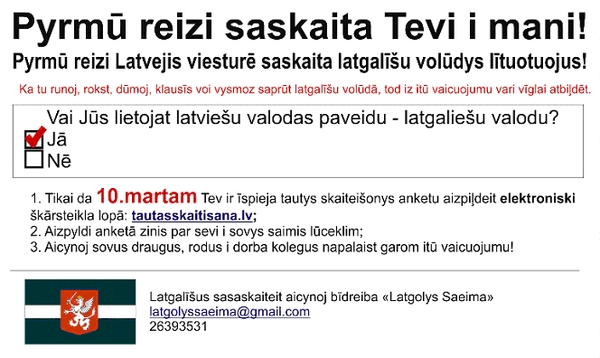
Odezwa namawiająca do deklarowania w Spisie Powszechnym 2011 znajomości języka łatgalskiego.
W dyskusji nad tym, czy łatgalski winien być uznany za odrębny język czy też nie, zdecydowanie dominują argumenty językowe oraz społeczno-polityczne, a nie socjolingwistyczne. Petycja o oficjalne uznanie łatgalskiego jako języka regionalnego skierowana do łotewskich władz przez uczestników II Łatgalistycznej konferencji naukowej odbywającej się w 2009 w Rēzekne spotkała się z odmownymi odpowiedziami ze strony Ministerstwa Sprawiedliwości oraz Ministerstwa Edukacji i Nauki. Odmowę umotywowano m.in. faktem, że Europejska karta języków regionalnych lub mniejszościowych nie uwzględnia możliwości nadania takiego statusu dialektowi języka państwowego (Lazdiņa & Marten 2012: 76–77
 Lazdiņa & Marten 2012 / komentarz/comment/r /
Lazdiņa & Marten 2012 / komentarz/comment/r / Lazdiņa, Sanita & Heiko F. Marten 2012. ”Latgalian in Latvia. A Continuous Struggle for Political Recognition”, Journal of Ethnopolitics and Minority Issues in Europe 11: 66–87.
 ). Tym niemniej łatgaliści są zdania, że istnieją szanse na przyznanie łatgalskiemu statusu języka regionalnego w najbliższej przyszłości (Nau 2011: 4
). Tym niemniej łatgaliści są zdania, że istnieją szanse na przyznanie łatgalskiemu statusu języka regionalnego w najbliższej przyszłości (Nau 2011: 4 Nau 2011 / komentarz/comment/r /
Nau 2011 / komentarz/comment/r / Nau, Nicole 2011. A short grammar of Latgalian. München: Lincom Europa.
 ). Niektórzy badacze w artykułach naukowych na temat łatgalskiego celowo używają w odniesieniu do niego określenia ‘język regionalny’, nawiązując do statusu m.in. języka kaszubskiego w Polsce czy dolnoniemieckiego w Niemczech (por. Nau 2012: 473
). Niektórzy badacze w artykułach naukowych na temat łatgalskiego celowo używają w odniesieniu do niego określenia ‘język regionalny’, nawiązując do statusu m.in. języka kaszubskiego w Polsce czy dolnoniemieckiego w Niemczech (por. Nau 2012: 473 Nau 2012 / komentarz/comment/r /
Nau 2012 / komentarz/comment/r / Nau, Nicole 2012. “Modality in an areal context: the case of a Latgalian dialect”, w: B. Wiemer i in. (red.) Grammatical replication and borrowability in language contact. Berlin: Mouton De Gruyter. 465–508.
 ).
).Domeny użycia
Język łatgalski w jego formie najbardziej zbliżonej do języka mówionego, tj. najmniej zbliżonej do standardowego łotewskiego, żyje w tekstach współczesnych dostępnych w Internecie: różnego rodzaju nieformalnych wypowiedziach pisemnych, opowiadaniach autoportretach łatgalskich pisarzy, oraz w tekstach ludowych, bajkach z przełomu XIX i XX w. (Nau 2011: 3 Nau 2011 / komentarz/comment/r /
Nau 2011 / komentarz/comment/r / Nau, Nicole 2011. A short grammar of Latgalian. München: Lincom Europa.
 ).
).Kontakty nieformalne
Język łatgalski istnieje przede wszystkim w mowie. Jest językiem kontaktów domowych, sąsiedzkich i innych sytuacji nieoficjalnych. Używanie łatgalskiego w kontaktach nieformalnych nie jest w żaden sposób oficjalnie ograniczone (Lazdiņa & Marten 2012: 80 Lazdiņa & Marten 2012 / komentarz/comment/r /
Lazdiņa & Marten 2012 / komentarz/comment/r / Lazdiņa, Sanita & Heiko F. Marten 2012. ”Latgalian in Latvia. A Continuous Struggle for Political Recognition”, Journal of Ethnopolitics and Minority Issues in Europe 11: 66–87.
 )
)Liturgia
Drugą najsilniejszą domeną użycia języka łatgalskiego jest sfera religijna. Łatgalski jest językiem liturgii katolickiej na terenie Łatgalii oraz poza jej obszarem, na Łotwie. W języku łatgalskim odprawiane są msze nawet w Rydze (Nau 2011: 6 Nau 2011 / komentarz/comment/r /
Nau 2011 / komentarz/comment/r / Nau, Nicole 2011. A short grammar of Latgalian. München: Lincom Europa.
 ). Katolicy na Łotwie najczęściej albo są Łatgalami, albo są pochodzenia łatgalskiego. Język łatgalski jest tradycyjnie językiem kościoła katolickiego na Łotwie. Częściowe wydawane jest w nim czasopismo katolickie Katolu dzeive, jednak coraz więcej artykułów pojawiają się tu w języku łotewskim
). Katolicy na Łotwie najczęściej albo są Łatgalami, albo są pochodzenia łatgalskiego. Język łatgalski jest tradycyjnie językiem kościoła katolickiego na Łotwie. Częściowe wydawane jest w nim czasopismo katolickie Katolu dzeive, jednak coraz więcej artykułów pojawiają się tu w języku łotewskim
W kościele w Wielonach (Viļāni). fot. Aleksandra Mrozińska 2012.

W redakcji czasopisma „Katōļu dzeive” - fot. Alexandra Mrozińska 2012.
Domeny oficjalne
Łatgalski nie jest językiem administracji publicznej. Nie ma też np. tablic informacyjnych czy znaków drogowych w języku łatgalskim. Użycie łatgalskiego w szkołach jest bardzo ograniczone, a inicjatywy edukacyjne na rzecz języka łatgalskiego są indywidualne, nie odgórne (Lazdiņa & Marten 2012: 70 Lazdiņa & Marten 2012 / komentarz/comment/r /
Lazdiņa & Marten 2012 / komentarz/comment/r / Lazdiņa, Sanita & Heiko F. Marten 2012. ”Latgalian in Latvia. A Continuous Struggle for Political Recognition”, Journal of Ethnopolitics and Minority Issues in Europe 11: 66–87.
 ). Edukacja w języku łatgalskim odbywa się tylko w ramach zajęć dodatkowych w szkołach podstawowych, a lekcje organizowane są z inicjatywy łatgalskich aktywistów i nauczycieli-Łatgalów (Lazdiņa & Marten 2012: 83
). Edukacja w języku łatgalskim odbywa się tylko w ramach zajęć dodatkowych w szkołach podstawowych, a lekcje organizowane są z inicjatywy łatgalskich aktywistów i nauczycieli-Łatgalów (Lazdiņa & Marten 2012: 83 Lazdiņa & Marten 2012 / komentarz/comment/r /
Lazdiņa & Marten 2012 / komentarz/comment/r / Lazdiņa, Sanita & Heiko F. Marten 2012. ”Latgalian in Latvia. A Continuous Struggle for Political Recognition”, Journal of Ethnopolitics and Minority Issues in Europe 11: 66–87.
 ). W oświacie łatgalski istnieje w jednym szeregu z dialektami łotewskiego, których użytkownicy nigdy nie podejmowali inicjatyw mających na celu uznanie odmiany za odrębny język (Lazdiņa & Marten 2012: 72
). W oświacie łatgalski istnieje w jednym szeregu z dialektami łotewskiego, których użytkownicy nigdy nie podejmowali inicjatyw mających na celu uznanie odmiany za odrębny język (Lazdiņa & Marten 2012: 72 Lazdiņa & Marten 2012 / komentarz/comment/r /
Lazdiņa & Marten 2012 / komentarz/comment/r / Lazdiņa, Sanita & Heiko F. Marten 2012. ”Latgalian in Latvia. A Continuous Struggle for Political Recognition”, Journal of Ethnopolitics and Minority Issues in Europe 11: 66–87.
 ).
).W sferze kontaktów oficjalnych, państwowych, użycie łatgalskiego w piśmie raczej nie jest akceptowane. Posługiwanie się łatgalskim w mowie dopuszczalne jest na szczeblu regionalnym, np. w urzędach gminnych pomiędzy osobami znającymi się nawzajem – tam, gdzie wiadomo, kto mówi po łatgalsku, a kto nie (Lazdiņa & Marten 2012: 80
 Lazdiņa & Marten 2012 / komentarz/comment/r /
Lazdiņa & Marten 2012 / komentarz/comment/r / Lazdiņa, Sanita & Heiko F. Marten 2012. ”Latgalian in Latvia. A Continuous Struggle for Political Recognition”, Journal of Ethnopolitics and Minority Issues in Europe 11: 66–87.
 ).
).Począwszy od roku 2008 odbywają się doroczne konferencje łatgalistyczna z serii Latgalistica. Są one zewnętrznym przejawem wzrostu zainteresowania językiem łatgalskim wśród środowisk akademickich (Lazdiņa & Marten 2012: 80
 Lazdiņa & Marten 2012 / komentarz/comment/r /
Lazdiņa & Marten 2012 / komentarz/comment/r / Lazdiņa, Sanita & Heiko F. Marten 2012. ”Latgalian in Latvia. A Continuous Struggle for Political Recognition”, Journal of Ethnopolitics and Minority Issues in Europe 11: 66–87.
 ). Rēzeknes Augstskola (Szkoła Wyższa w Rzeżycy) oraz Uniwersytet w Dyneburgu prowadzą studia wyższe w zakresie języka łatgalskiego.
). Rēzeknes Augstskola (Szkoła Wyższa w Rzeżycy) oraz Uniwersytet w Dyneburgu prowadzą studia wyższe w zakresie języka łatgalskiego. Media i życie kulturalne
Ostatnie lata to znaczący wzrost użycia języka łatgalskiego przede wszystkim w Internecie, np. portal www.latgola.lv.Istnieje gazeta elektroniczna LaKuGa (www.lakuga.lv/lg) oraz szereg stron poświęconych historii i kulturze Łatgalii w tym języku. Ponadto prowadzone są łatgalskojęzyczne blogi.
Działa też radio w języku łatgalskim – Latgolys radeja (www.lr.lv) jednak należy ono obecnie do Kościoła katolickiego. Bardzo wielu wykonawców tworzy muzykę w języku łatgalskim (http://lakuga.lv/latgalisu-muzyka).
Inne domeny
W Łatgalii można spotkać nieliczne przykłady symbolicznego użycia języka łatgalskiego, takie jak nadawanie firmom czy lokalom gastronomicznym łatgalskojęzycznych nazw. Są to przykłady świadczące o wzroście prestiżu tego języka wśród lokalnej społeczności, a także o tym, że łatgalski staje się coraz wyraźniejszym znakiem tożsamości regionalnej Łatgalów (Lazdiņa & Marten 2012: 80 Lazdiņa & Marten 2012 / komentarz/comment/r /
Lazdiņa & Marten 2012 / komentarz/comment/r / Lazdiņa, Sanita & Heiko F. Marten 2012. ”Latgalian in Latvia. A Continuous Struggle for Political Recognition”, Journal of Ethnopolitics and Minority Issues in Europe 11: 66–87.
 ).
). 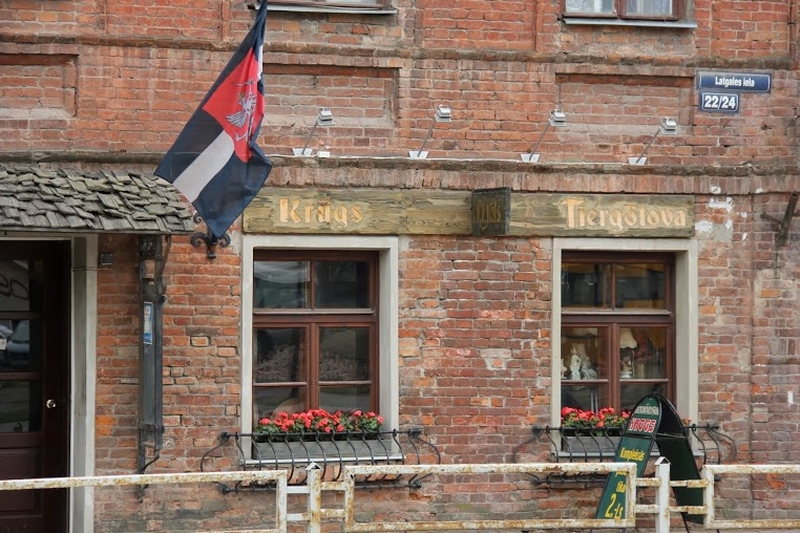
Łatgalskie napisy w Rzeżycy (Rēzekne): Mōls ‘Glina’ (nazwa lokalu); krūgs ‘pub’, tiergōtava ‘sklep’. fot. A. Mrozińska
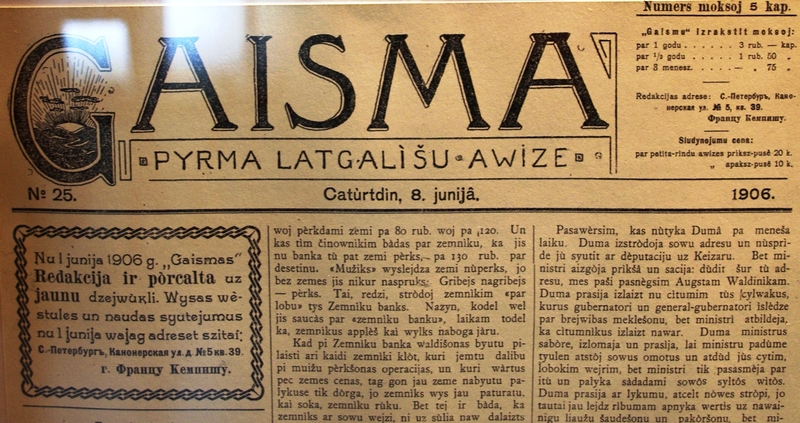
Gaisma – pierwsza gazeta łatgalskojęzyczna. fot. T. Wicherkiewicz
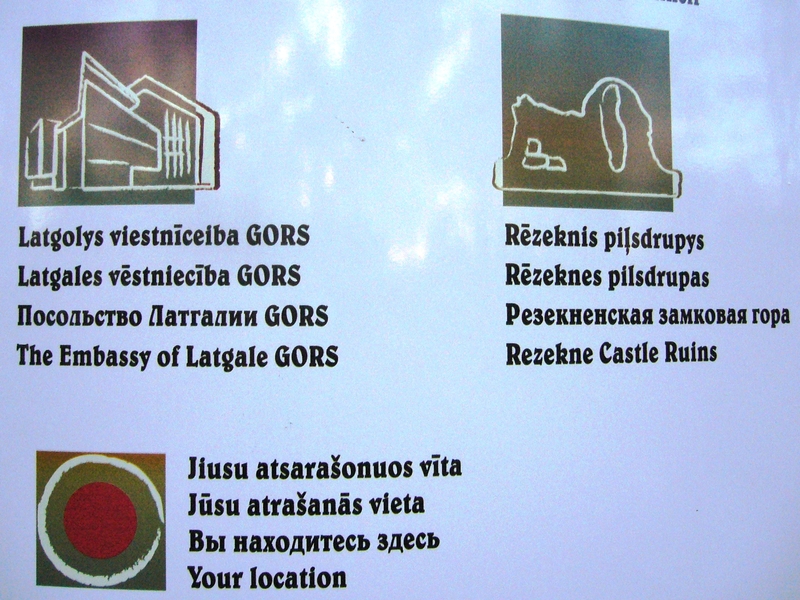
Infomacja turystyczna w Rzeżycy (Rēzekne) - pierwsze 2 języki to łatgalski i łotewski. fot. N. Nau
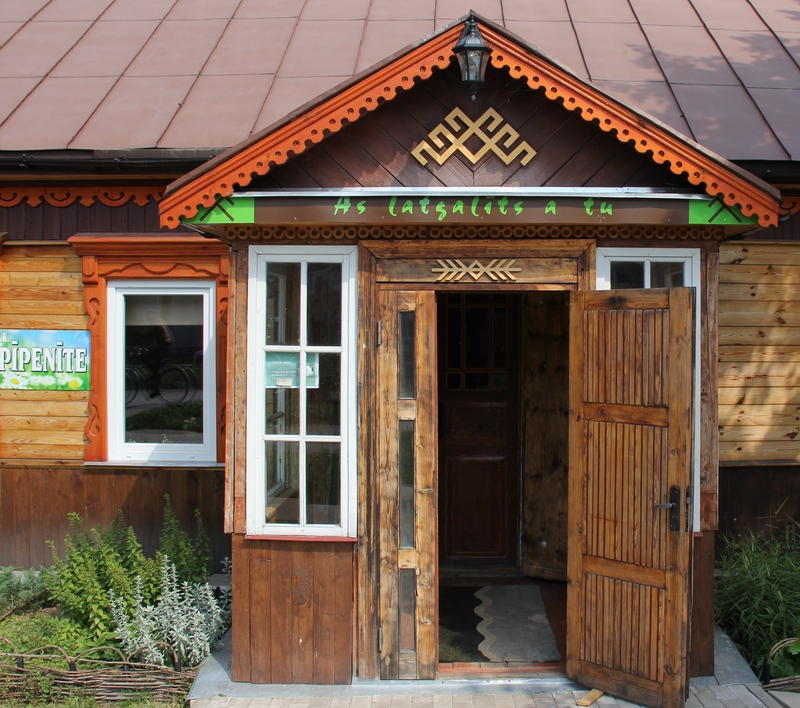
Łatgalski sklep w Korsówce (Kuorsova). fot. T. Wicherkiewicz
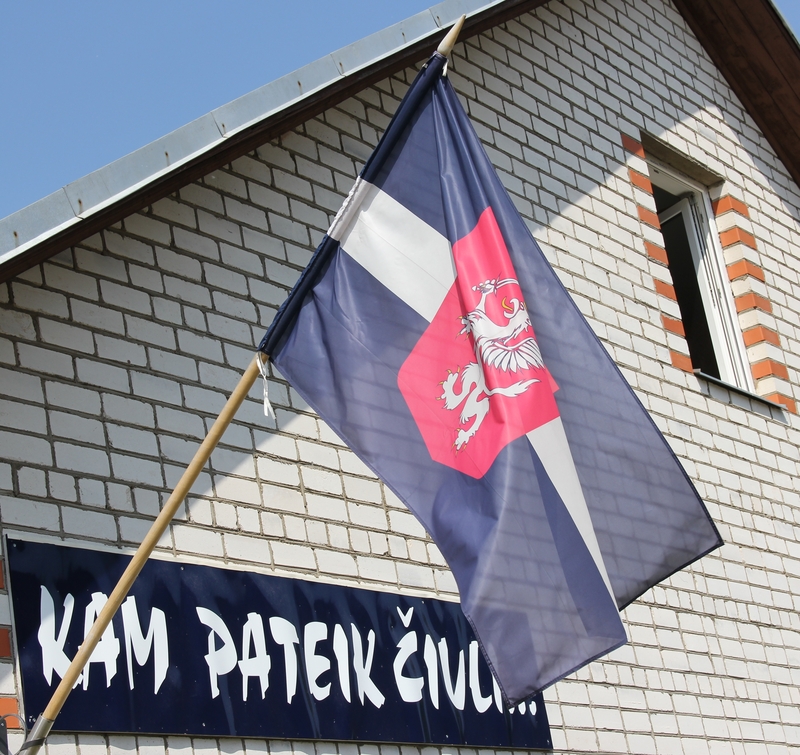
Łatgalskie napisy w Korsówce (Kuorsova). fot. T. Wicherkiewicz
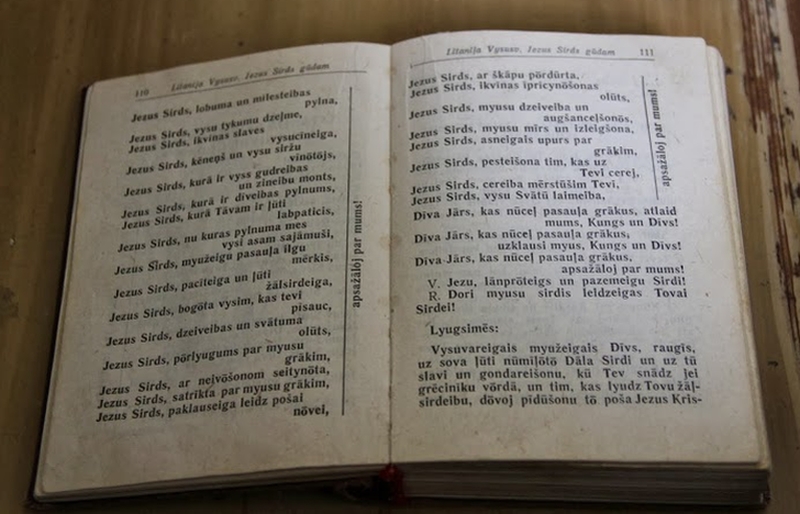
Łatgalskojęzyczny modlitewnik katolicki. fot. T. Wicherkiewicz
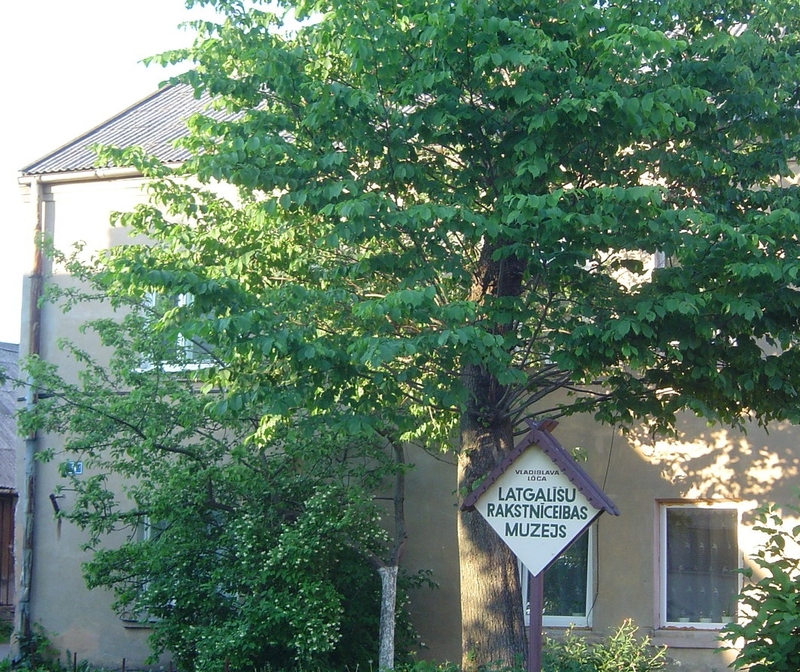
Muzeum literatury łatgalskiej w Rzeżycy (Rēzekne) - stan w 2007. fot. T. Wicherkiewicz
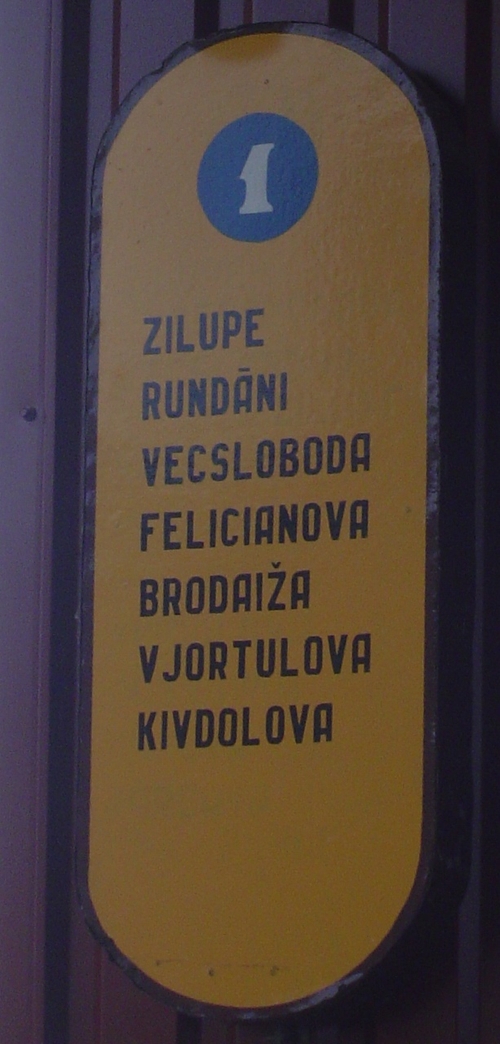
Nazwy wsi w Łatgalii. fot. T. Wicherkiewicz
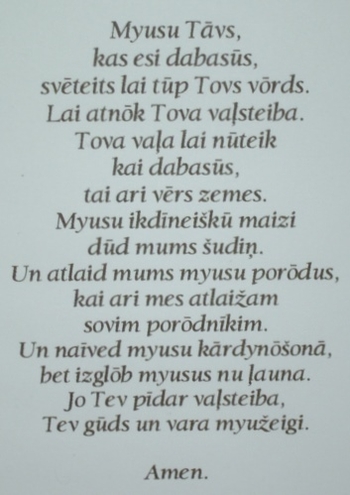
„Ojcze nasz” po łatgalsku
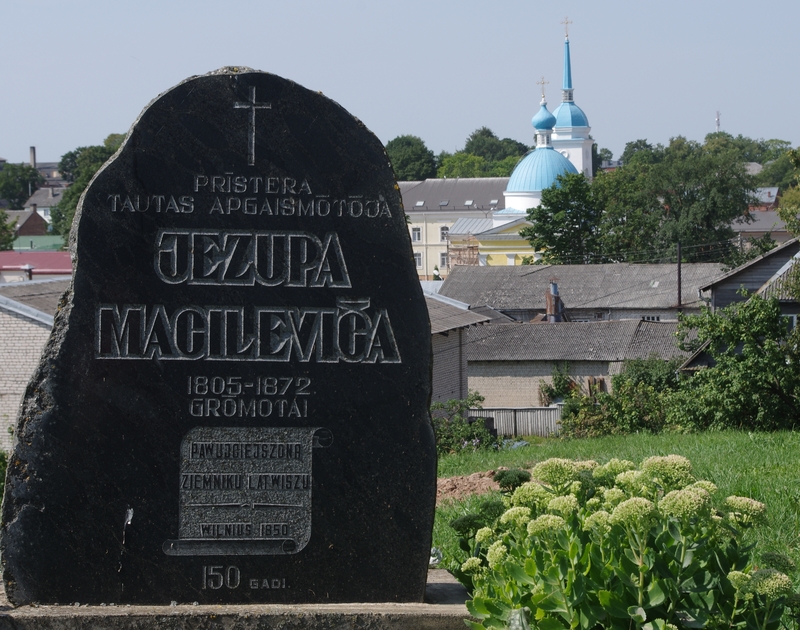
Pomnik J. Macilewicza w Lucynie (Ludza) - u dołu tytuł jego dzieła „Pawujciejszona un wyssajdi sposobi diel ziemniku latwiszu” w starej pisowni (1858). fot. T. Wicherkiewicz
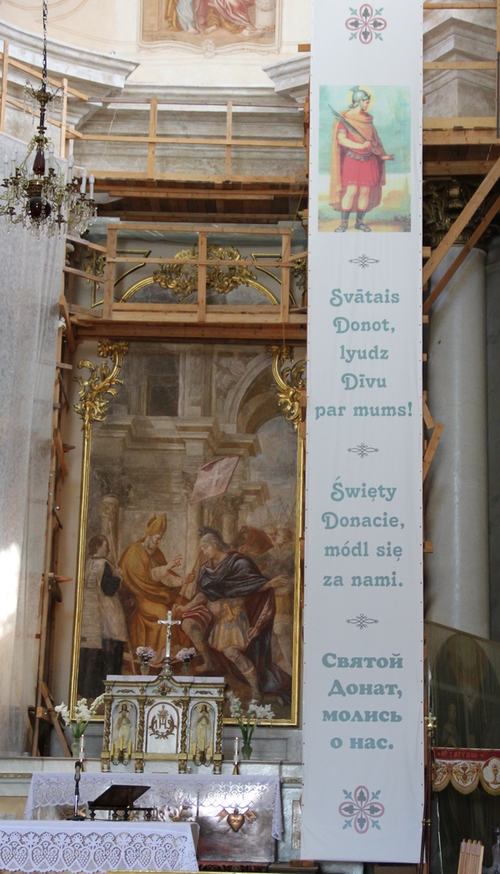
W kościele w Krasławiu (Kruoslova). fot. T. Wicherkiewicz
Stosunek do języka łatgalskiego
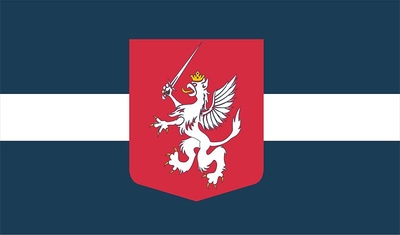
Flaga Łatgalii
Większość użytkowników łatgalskiego uważa się za Łotyszy mówiących osobnym językiem – łatgalskim (Nau 2011: 4
 Nau 2011 / komentarz/comment/r /
Nau 2011 / komentarz/comment/r / Nau, Nicole 2011. A short grammar of Latgalian. München: Lincom Europa.
 ). Łatgalski stanowi wyznacznik odrębności językowej (Lazdiņa & Marten 2012: 68
). Łatgalski stanowi wyznacznik odrębności językowej (Lazdiņa & Marten 2012: 68 Lazdiņa & Marten 2012 / komentarz/comment/r /
Lazdiņa & Marten 2012 / komentarz/comment/r / Lazdiņa, Sanita & Heiko F. Marten 2012. ”Latgalian in Latvia. A Continuous Struggle for Political Recognition”, Journal of Ethnopolitics and Minority Issues in Europe 11: 66–87.
 ), ale nie etnicznej: dla mieszkańców Łatgalii ważna jest ich tożsamość regionalna, która jednak w żaden sposób nie stoi w opozycji do łotewskiej tożsamości narodowej (Lazdiņa & Marten 2012: 71
), ale nie etnicznej: dla mieszkańców Łatgalii ważna jest ich tożsamość regionalna, która jednak w żaden sposób nie stoi w opozycji do łotewskiej tożsamości narodowej (Lazdiņa & Marten 2012: 71 Lazdiņa & Marten 2012 / komentarz/comment/r /
Lazdiņa & Marten 2012 / komentarz/comment/r / Lazdiņa, Sanita & Heiko F. Marten 2012. ”Latgalian in Latvia. A Continuous Struggle for Political Recognition”, Journal of Ethnopolitics and Minority Issues in Europe 11: 66–87.
 ).
).Badania nad stosunkiem społeczności do języka przeprowadzone w ostatnich latach (przede wszystkim Šuplinska & Lazdiņa 2009
 Šuplinska & Lazdiņa 2009 / komentarz/comment/r /
Šuplinska & Lazdiņa 2009 / komentarz/comment/r / Šuplinska, Ilga & Sanita Lazdiņa (red.) 2009. Valodas Austrumlatvijā: pētījuma dati un rezultāti. Via Latgalica: humanitarno zinātņu žurnāla pelikums 1. Rēzekne: Rēzeknes Augustskola.
 ) wykazały, że ogólny stosunek Łatgalów do łatgalskiego jest raczej pozytywny. 35% Łatgalów chce uznania języka łatgalskiego jako oficjalnego na Łotwie, przeciwnego zdania jest 33,9%. Dla 58.9% posługiwanie się językiem łatgalskim jest kluczowym warunkiem przynależności do społeczności Łatgalów. 77% chce języka łatgalskiego w szkole, ale tylko 8,3% jest zdania, że powinien być obecny w edukacji ponadpodstawowej. 10,5% uważa, że łatgalski powinien być nauczany w szkołach obowiązkowo jako drugi język (Lazdiņa & Marten 2012: 70–71
) wykazały, że ogólny stosunek Łatgalów do łatgalskiego jest raczej pozytywny. 35% Łatgalów chce uznania języka łatgalskiego jako oficjalnego na Łotwie, przeciwnego zdania jest 33,9%. Dla 58.9% posługiwanie się językiem łatgalskim jest kluczowym warunkiem przynależności do społeczności Łatgalów. 77% chce języka łatgalskiego w szkole, ale tylko 8,3% jest zdania, że powinien być obecny w edukacji ponadpodstawowej. 10,5% uważa, że łatgalski powinien być nauczany w szkołach obowiązkowo jako drugi język (Lazdiņa & Marten 2012: 70–71 Lazdiņa & Marten 2012 / komentarz/comment/r /
Lazdiņa & Marten 2012 / komentarz/comment/r / Lazdiņa, Sanita & Heiko F. Marten 2012. ”Latgalian in Latvia. A Continuous Struggle for Political Recognition”, Journal of Ethnopolitics and Minority Issues in Europe 11: 66–87.
 ).
).Jak piszą Lazdiņa & Marten (2012
 Lazdiņa & Marten 2012 / komentarz/comment/r /
Lazdiņa & Marten 2012 / komentarz/comment/r / Lazdiņa, Sanita & Heiko F. Marten 2012. ”Latgalian in Latvia. A Continuous Struggle for Political Recognition”, Journal of Ethnopolitics and Minority Issues in Europe 11: 66–87.
 ), wśród środowisk akademickich istnieje duża rozbieżność pomiędzy postrzeganiem łatgalskiego w Łatgalii a na reszcie Łotwy oraz poza jej granicami, przy czym według autorów trudno językoznawców spoza Łotwy posądzać o jakiąkolwiek ideologiczną motywację nieuznawania czy też wręcz ignorowania łatgalskiego (Lazdiņa i Marten 2012: 74
), wśród środowisk akademickich istnieje duża rozbieżność pomiędzy postrzeganiem łatgalskiego w Łatgalii a na reszcie Łotwy oraz poza jej granicami, przy czym według autorów trudno językoznawców spoza Łotwy posądzać o jakiąkolwiek ideologiczną motywację nieuznawania czy też wręcz ignorowania łatgalskiego (Lazdiņa i Marten 2012: 74 Lazdiņa & Marten 2012 / komentarz/comment/r /
Lazdiņa & Marten 2012 / komentarz/comment/r / Lazdiņa, Sanita & Heiko F. Marten 2012. ”Latgalian in Latvia. A Continuous Struggle for Political Recognition”, Journal of Ethnopolitics and Minority Issues in Europe 11: 66–87.
 ).
). W łotewskim społeczeństwie łatgalski postrzegany jest niewątpliwie jako część dziedzictwa kulturowego Łotwy. Brakuje mu jednak prestiżu przypisywanego językowi łotewskiemu oraz językom egzogenicznym, czyli nie rodzimym na Łotwie, takim jak np. angielski.
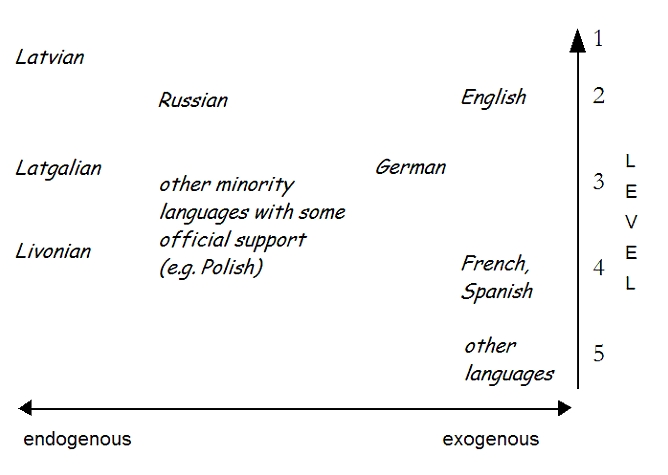
 Lazdiņa & Marten 2012 / komentarz/comment/r /
Lazdiņa & Marten 2012 / komentarz/comment/r / Lazdiņa, Sanita & Heiko F. Marten 2012. ”Latgalian in Latvia. A Continuous Struggle for Political Recognition”, Journal of Ethnopolitics and Minority Issues in Europe 11: 66–87.
 )
)Jeśli można mówić o jakiejkolwiek polityce językowej wobec łatgalskiego na Łotwie, to jest ona w dużej mierze nieoficjalna i można ją scharakteryzować jako ogólną postawę tolerancji. Przychylność łatgalskiemu jest jednak tym mniejsza, im bardziej oficjalne są domeny użycia, w których łatgalscy aktywiści dopominają się o obecność ich języka (Lazdiņa & Marten 2012: 73
 Lazdiņa & Marten 2012 / komentarz/comment/r /
Lazdiņa & Marten 2012 / komentarz/comment/r / Lazdiņa, Sanita & Heiko F. Marten 2012. ”Latgalian in Latvia. A Continuous Struggle for Political Recognition”, Journal of Ethnopolitics and Minority Issues in Europe 11: 66–87.
 ).
). Na Łotwie brak oficjalnej polityki w odniesieniu do łatgalskiego. Przy okazji wyborów często dochodzi do sytuacji, w których celem zdobycia poparcia wcale sporej społeczności łatgalskiej, działacze partyjni deklarują przychylność wobec łatgalskiego, po czym wycofują się z tych obietnic po wyborach (Lazdiņa & Marten 2012: 76–77
 Lazdiņa & Marten 2012 / komentarz/comment/r /
Lazdiņa & Marten 2012 / komentarz/comment/r / Lazdiņa, Sanita & Heiko F. Marten 2012. ”Latgalian in Latvia. A Continuous Struggle for Political Recognition”, Journal of Ethnopolitics and Minority Issues in Europe 11: 66–87.
 ). Stosunek polityków do łatgalskiego jest przychylny o tyle, o ile służy to innym celom politycznym, co prowadzi do konkluzji, że uregulowanie statusu języka łatgalskiego nadrzędnym celem nie jest (Lazdiņa & Marten 2012: 79
). Stosunek polityków do łatgalskiego jest przychylny o tyle, o ile służy to innym celom politycznym, co prowadzi do konkluzji, że uregulowanie statusu języka łatgalskiego nadrzędnym celem nie jest (Lazdiņa & Marten 2012: 79 Lazdiņa & Marten 2012 / komentarz/comment/r /
Lazdiņa & Marten 2012 / komentarz/comment/r / Lazdiņa, Sanita & Heiko F. Marten 2012. ”Latgalian in Latvia. A Continuous Struggle for Political Recognition”, Journal of Ethnopolitics and Minority Issues in Europe 11: 66–87.
 ). Niechęć do zajęcia się tą kwestią może poniekąd wynikać ze strachu przed koniecznością oficjalnego zrewidowania składu etnicznego Łotwy, co samo w sobie jest w dużej mierze nieuzasadnione, gdyż Łatgalowie w wymiarze narodowościowym uważają się za Łotyszy. Jak podkreślają socjolingwiści zajmujący się tematyką łatgalską, duży stopień scentralizowania procesu podejmowania oficjalnych decyzji na Łotwie oraz brak znajomości kontekstu regionalnego wśród ryskich warstw urzędniczych, a do niedawna brak wyrazistej polityki regionalnej w skali kraju powoduje, że kwestia stosunkowo łatwa do uregulowania napotyka na nieuzasadniony opór i urzędniczą niemoc (Lazdiņa & Marten 2012: 84
). Niechęć do zajęcia się tą kwestią może poniekąd wynikać ze strachu przed koniecznością oficjalnego zrewidowania składu etnicznego Łotwy, co samo w sobie jest w dużej mierze nieuzasadnione, gdyż Łatgalowie w wymiarze narodowościowym uważają się za Łotyszy. Jak podkreślają socjolingwiści zajmujący się tematyką łatgalską, duży stopień scentralizowania procesu podejmowania oficjalnych decyzji na Łotwie oraz brak znajomości kontekstu regionalnego wśród ryskich warstw urzędniczych, a do niedawna brak wyrazistej polityki regionalnej w skali kraju powoduje, że kwestia stosunkowo łatwa do uregulowania napotyka na nieuzasadniony opór i urzędniczą niemoc (Lazdiņa & Marten 2012: 84 Lazdiņa & Marten 2012 / komentarz/comment/r /
Lazdiņa & Marten 2012 / komentarz/comment/r / Lazdiņa, Sanita & Heiko F. Marten 2012. ”Latgalian in Latvia. A Continuous Struggle for Political Recognition”, Journal of Ethnopolitics and Minority Issues in Europe 11: 66–87.
 ).
).Łatgalski jako język zagrożony
Transmisja międzypokoleniowa języka łatgalskiego jest szeroka i dotyczy większości łatgalskojęzycznych domów, choć wiele łatgalskich rodzin nie przekazuje już języka kolejnym pokoleniom (Lazdiņa & Marten 2012: 82–83 Lazdiņa & Marten 2012 / komentarz/comment/r /
Lazdiņa & Marten 2012 / komentarz/comment/r / Lazdiņa, Sanita & Heiko F. Marten 2012. ”Latgalian in Latvia. A Continuous Struggle for Political Recognition”, Journal of Ethnopolitics and Minority Issues in Europe 11: 66–87.
 ).
). Atlas of the World's Languages in Danger UNESCO klasyfikuje łatgalski jako narażony na zagrożenie (vulnerable). Łatgalskiemu niewątpliwie nie grozi rychłe wymarcie, ale z uwagi na to, że np. nie jest językiem używanym w kontaktach oficjalnych, nie można go uznać za zupełnie bezpieczny. Poza tym liczba osób aktywnie posługujących się językiem łatgalskim sukcesywnie spada (Lazdiņa & Marten 2012: 81
 Lazdiņa & Marten 2012 / komentarz/comment/r /
Lazdiņa & Marten 2012 / komentarz/comment/r / Lazdiņa, Sanita & Heiko F. Marten 2012. ”Latgalian in Latvia. A Continuous Struggle for Political Recognition”, Journal of Ethnopolitics and Minority Issues in Europe 11: 66–87.
 ).
).Perspektywy dla języka łatgalskiego
Łatgalski jest używany w wielu domenach oraz jest przedmiotem zainteresowania językoznawców. Mimo malejącej liczby użytkowników, w dalszym ciągu można mówić o 164 tysiącach osób posługujących się łatgalskim, co stawia ten język w dość bezpiecznym położeniu w porównaniu z wieloma innymi językami zagrożonymi. W dalszym ciągu język łatgalski przekazywany jest z pokolenia na pokolenie. Ponadto obecnie użytkownicy łatgalskiego mają do niego pozytywny stosunek, który bardzo często manifestują. Aktywiści na rzecz łatgalskiego - a są wśród nich także nie-Łatgalowie - są coraz bardziej słyszalni poza granicami Łotwy.Z drugiej jednak strony, z powodu niejasnego stosunku władz łotewskich do łatgalskiego, a w zasadzie braku oficjalnej polityki względem tego języka trudno cokolwiek przewidzieć odnośnie jego rozwoju, jak też trudno mieć nadzieje na rozkwit języka łatgalskiego (Lazdiņa & Marten 2012: 75
 Lazdiņa & Marten 2012 / komentarz/comment/r /
Lazdiņa & Marten 2012 / komentarz/comment/r / Lazdiņa, Sanita & Heiko F. Marten 2012. ”Latgalian in Latvia. A Continuous Struggle for Political Recognition”, Journal of Ethnopolitics and Minority Issues in Europe 11: 66–87.
 ). Brak polityki językowej wobec łatgalskiego oraz kwestie społeczno-ekonomiczne (Łatgalia należy do najbiedniejszych regionów Łotwy i wielu Łatgalów w poszukiwaniu lepszego życia emigruje do stolicy lub za granicę, gdzie stopniowo zatraca swój język - Lazdiņa & Marten 2012: 84
). Brak polityki językowej wobec łatgalskiego oraz kwestie społeczno-ekonomiczne (Łatgalia należy do najbiedniejszych regionów Łotwy i wielu Łatgalów w poszukiwaniu lepszego życia emigruje do stolicy lub za granicę, gdzie stopniowo zatraca swój język - Lazdiņa & Marten 2012: 84 Lazdiņa & Marten 2012 / komentarz/comment/r /
Lazdiņa & Marten 2012 / komentarz/comment/r / Lazdiņa, Sanita & Heiko F. Marten 2012. ”Latgalian in Latvia. A Continuous Struggle for Political Recognition”, Journal of Ethnopolitics and Minority Issues in Europe 11: 66–87.
 ) nie rokują dla łatgalskiego zbyt optymistycznie.
) nie rokują dla łatgalskiego zbyt optymistycznie.W przygotowaniu jest korpus języka łatgalskiego.
Próbki tekstów.
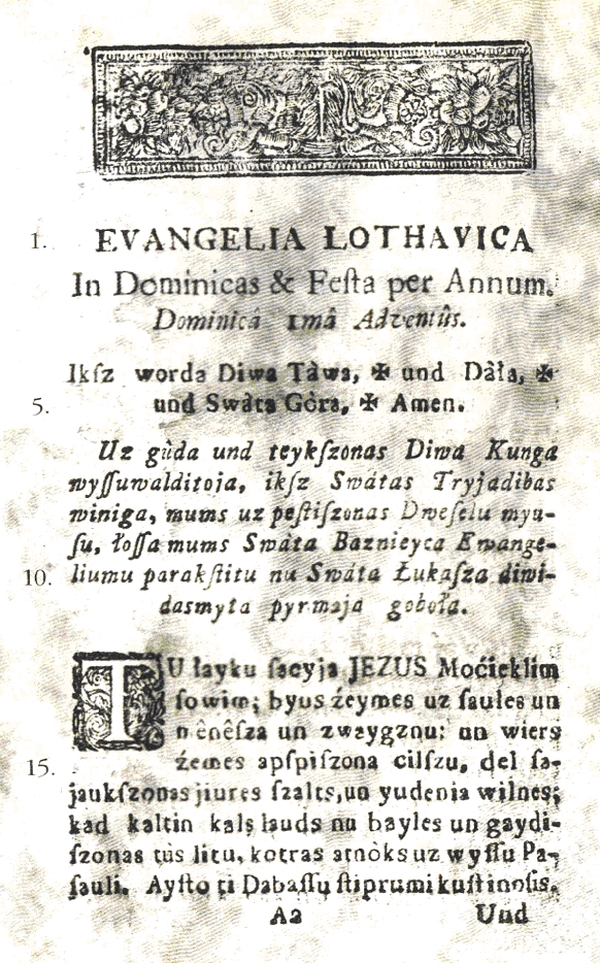
Evangelia toto anno 1753 – pierwszy zabytek piśmiennictwa łatgalskiego (źródło: Stafecka 2004
 Stafecka 2004 / komentarz/comment/r /
Stafecka 2004 / komentarz/comment/r / Stafecka, Anna 2004. "Evangelia toto anno... (1753) and the development of the written word in Latgale”, w: Evangelia toto anno 1753. Pirmā latgaliešu grāmata. Rīga: LU Latviešu valodas institūts. 316–345.
 ).
).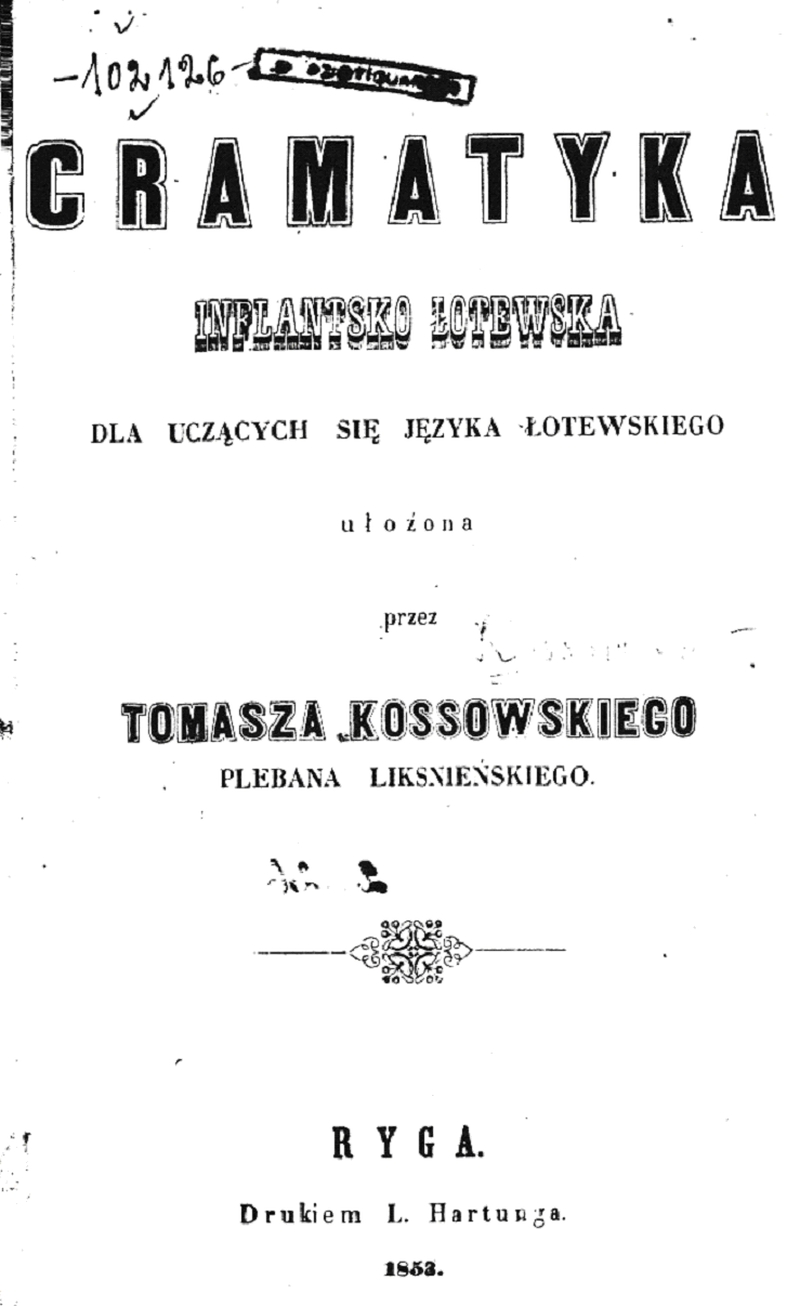
Strona tytułowa pierwszej gramatyki języka łatgalskiego autorstwa Tomasza Kossowskiego z 1853r.
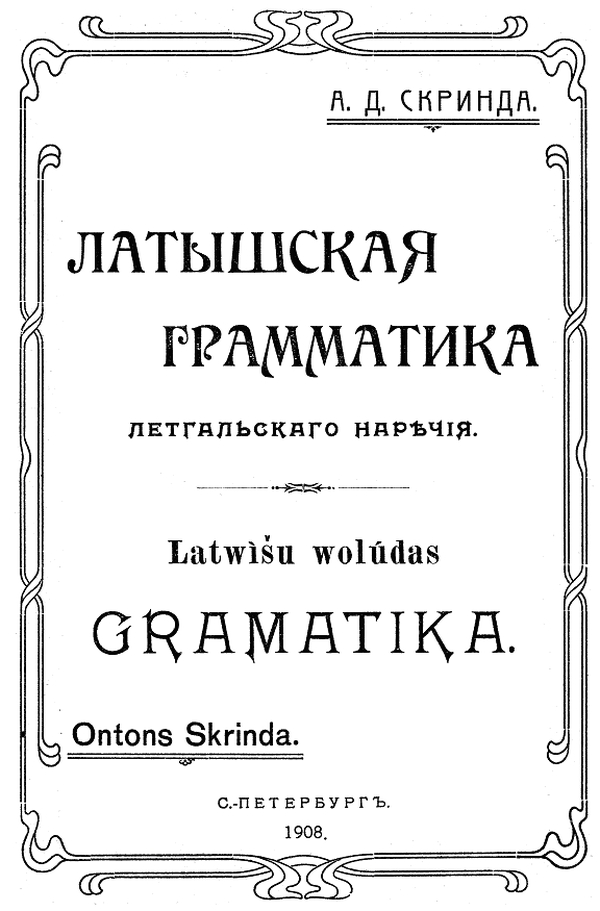
Strona tytułowa gramatyki języka łatgalskiego autorstwa Ontosa Skrindy z 1908r.
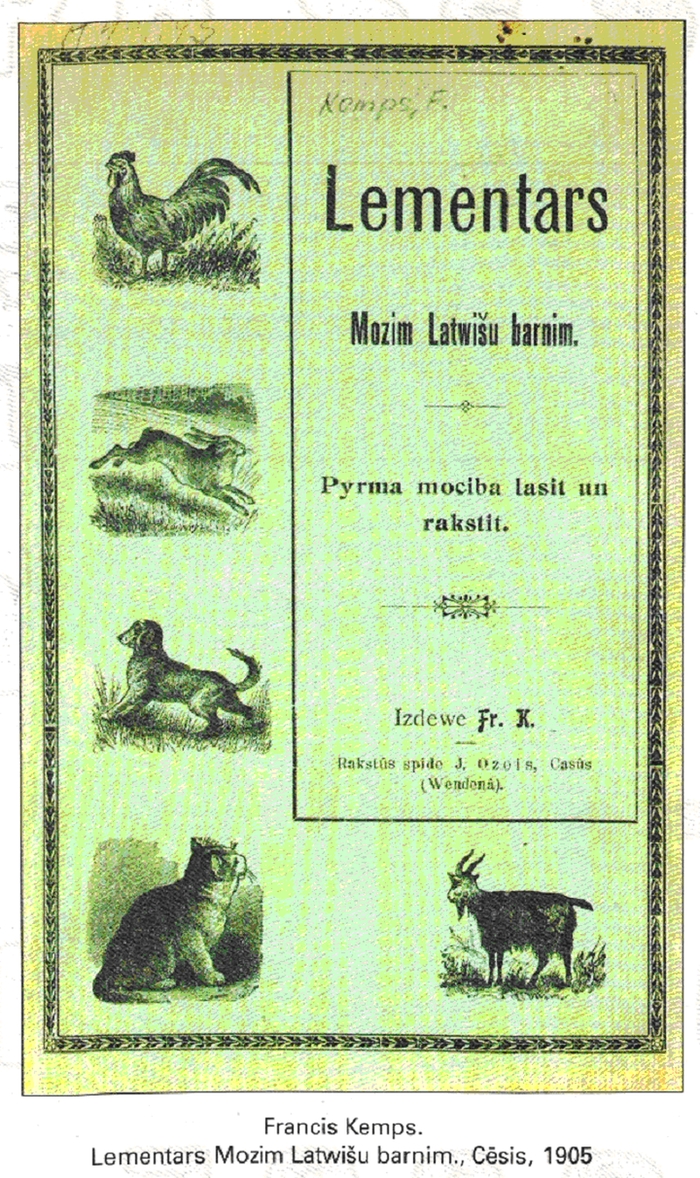
Elementarz języka łatgalskiego Francisa Kempsa z roku 1905. (źródło: Cibuļs 2009
 Cibuļs 2009 / komentarz/comment/r /
Cibuļs 2009 / komentarz/comment/r / Cibuļs, Juris 2009. Latgaliešu ābeces 1768 – 2008. Rīga: Zinātne.
 )
)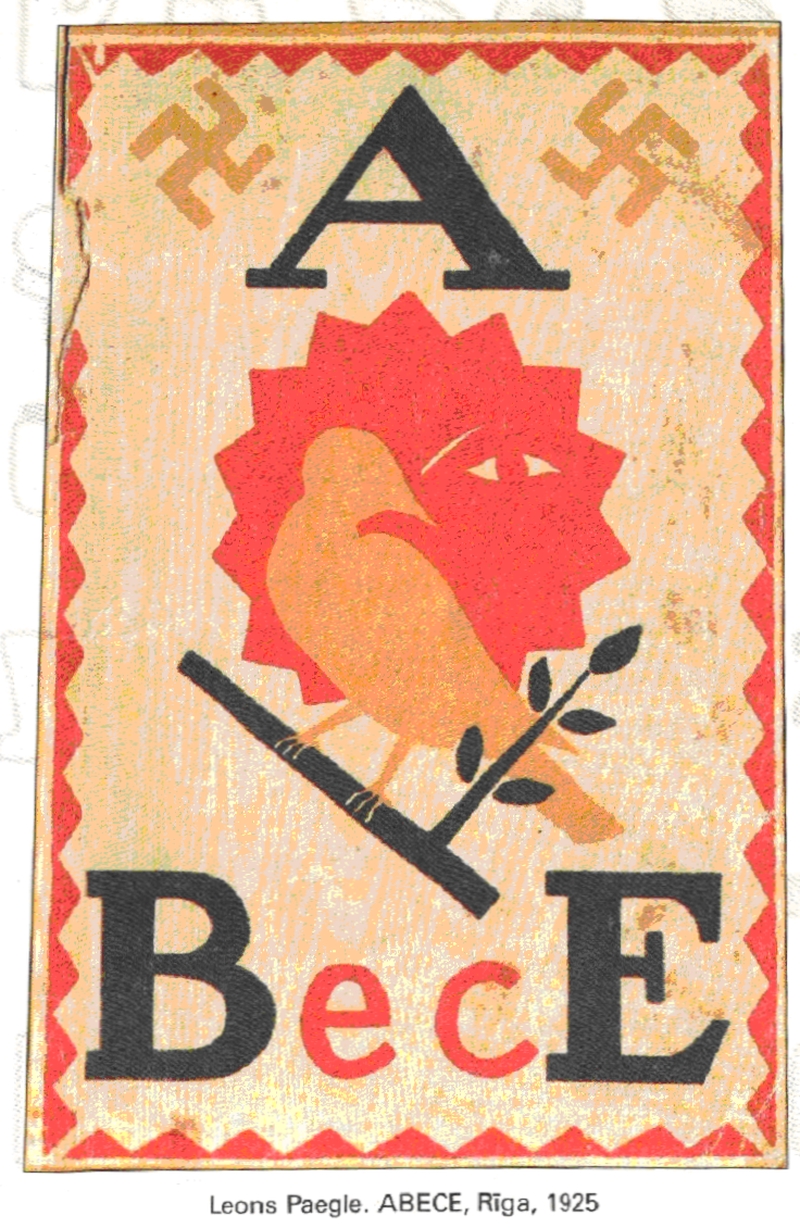
Elementarz języka łatgalskiego Leonsa Paegle z roku 1925 (źródło: Cibuļs 2009
 Cibuļs 2009 / komentarz/comment/r /
Cibuļs 2009 / komentarz/comment/r / Cibuļs, Juris 2009. Latgaliešu ābeces 1768 – 2008. Rīga: Zinātne.
 ).
).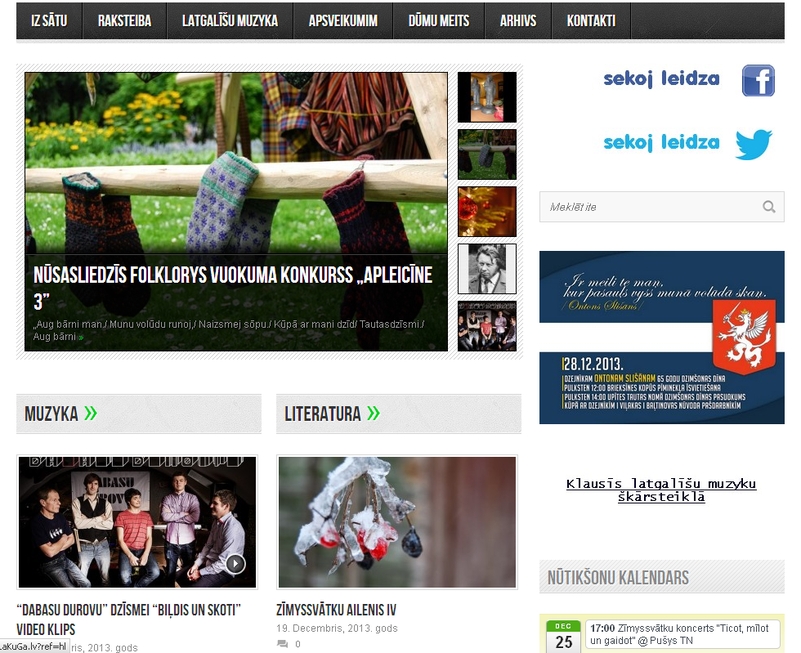
Zrzut ze strony głównej łatgalskiej gazety internetowej LaKuGa (www.lakuga.lv), dostęp: 25.12.2013.
Kod ISO
ISO 639-3 / SIL ltg
- General remarks
- Biogram Maruty Latkowskiej
- Fraszki 1 (474)
- Fraszki 2. (475)
- Glupa sīva; Fraszki 3 (475)
- Fraszki 4 (476)
- Fraszki 5 (476)
- Muote i meita; Fraszki 6 (476-477)
- Brauc cylvāks ar linim; Fraszki 7 (477)
- Fraszki 8 (478)
- Sīva vuorej putru; Fraszki 9 (478-479)
- Sīva, kur namuok aust; Fraszki 10 (479)
- Baznīckungs i saiminīki; Fraszki 11 (479-480)
- Dīvs i valns; Fraszki 12 (480-481)
- Fraszki 13 (481 – 482)
- Fraszki 14 (482 – 483)
- Zaglis pī baznīckunga; Fraszki 15 (483 – 485)
- Tuksneits; Fraszki 16 (485)
- Fraszki 17 485 – 486 (Ap divi italiś).
- Fraszki 18 486 – 487 (Ap divi bruolim).
- Fraszki 19 (487 – 489)
- Mužiceņš i starostys; Fraszki 20 (489)
- Fraszki 21 (490)
- Popa kolps; Fraszki 22 (490 – 492)
- Kdz. 1. (107)
- Kdz. 2. (107-108)
- Kdz. 3. (108-109)
- Kdz. 4. (109-110)
- Kdz.5. (110)
- Teišam jīveņu sylā stotom; Kdz.6. (110-111)
- Gaismeņa ausa (Oi, agri, agri); Kdz.7. (111-112)
- Kdz.8. (113)
- Kdz.9. (113-114)
- Kdz.10. (114)
- Kdz.11. (114-115)
- Kdz.12. (115-116)
- Kdz.13.(116)
- Kdz.14. (116-117)
- Kdz.15. (117)
- Kdz.16. (118)
- Kdz.17. (118)
- Kdz.18. (119)
- Kdz.19. (119-120)
- Kdz.20. (120)
- Kdz.21. (120-121)
- Kdz.22.(121)
- Kdz.23. (121-122)
- Kdz.24. (123-125)
- Kdz.25.(124-125)
- Moza, moza uobeļnīca (Kdz. 26.(125))
- Kdz. 27. (126-127)
- Kdz.28. (127)
- Kdz.29.(127-128)
- Kdz.30.(128-129)
- Kdz.31. (129)
- Kdz.32. (129-130)
- Kdz.33.(130)
- Kdz. 34. (130)
- Kdz.35.(130)
- Kdz.36.(131)
- Kdz.37.(131)
- Kdz.38.(131)
- Kdz.39.(131)
- Kdz.40.(132)
- Kdz.41.(132)
- Kdz.42.(132)
- Kdz.43.(133)
- Kdz.44.(133-134)
- Dzīd ar vīnu (Kkr.1.(135))
- Kkr.3.(135)
- Kkr.4.(135)
- Kkr.5.(135)
- Kkr.6.(135)
- Kkr.7.(135)
- Kkr.8.(135)
- Kkr.9.(135)
- Kkr.10.(136)
- Kkr.11.(136)
- Na eļkšņom taidy goldy (Kkr. 2 (135))
- Es byutumu šūrudin (Roz 13. (180))
- Buoleņš guoja karakaltu (Kar 2. (162-163))
- Sādādama sev duorzeņā (Roz 3. (175 – 176))
- Zīmeļs i Saule (Północny Wiatr i Słońce)
- Kkr.12.(136)
- Kkr.13.(136)
- Kkr.14.(136)
- Kkr.15.(136)
- Kkr.16.(136)
- Kkr.17.(136)
- Kkr.18.(137)
- Kkr.19.(137)
- Kkr.20.(137)
- Kkr.21.(137)
- Kkr.22.(137)
- Kkr.23.(137)
- Kkr.24.(137)
- Kkr.25.(137)
- Kkr.26.(137-138)
- Kkr.27.(138)
- Kkr.28.(138)
- Kkr.29.(138)
- Kkr.30.(138)
- Kkr.31.(138)
- Kkr.32.(138)
- Kkr.33.(138)
- Kkr.34.(139)
- Kkr.35.(139)
- Kkr.36.(139)
- Kkr.37.(139)
- Kkr.38.(139)
- Kkr.39.(139)
- Kkr.40.(139)
- Kkr.41.(139)
- Kkr.42.(140)
- Kkr.43.(140)
- Kkr.44.(140)
- Kkr.45.(140)
- Kkr.46.(140)
- Kkr.47.(140)
- Kkr.48.(140)
- Kkr.49.(140)
- Kkr.50.(140)
- Kkr.51.(140-141)
- Kkr.52.(141)
- Kkr.53.(141)
- Kkr.54.(141)
- Kkr.55.(141)
- Kkr.56.(141)
- Kkr.57.(141)
- Kkr.58.(141)
- Kkr.59.(141)
- Kkr.60.(142)
- Kkr.61.(142)
- Kkr.62.(142)
- Kkr.63.(142)
- Kkr.64.(142)
- Kkr.65.(142)
- Kkr.66.(142)
- Kkr.67.(142)
- Kkr.68.(142)
- Kkr.69.(143)
- Kkr.70.(143)
- Kkr.71.(143)
- Kkr.72.(143)
- Kkr.73.(143)
- Kkr.74.(143)
- Kkr.75.(143)
- Kkr.76.(143)
- Kkr.77.(144)
- Kkr.78.(144)
- Kkr.79.(144)
- Kkr.80.(144)
- Kkr.81.(144)
- Kkr.82.(144)
- Kkr.83.(144)
- Kkr.84.(144)
- Kkr.85.(144-145)
- Kkr.86.(145)
- Kkr.87.(145)
- Kkr.88.(145)
- Kkr.89.(145)
- Kkr.90.(145)
- Kkr.91.(145)
- Kkr.92.(145)
- Kkr.93.(145)
- Kkr.94.(146)
- Kkr.95.(146)
- Kkr.96.(146)
- Kkr.97.(146)
- Kkr.98.(146)
- Kkr.99.(146)
- Kkr.100.(146)
- Kkr.101.(146)
- Kkr.102.(147)
- Kkr.103.(147)
- Kkr.104.(147)
- Rokr 105. (147)
- Rokr 106. (147)
- Rokr 107. (147)
- Rokr 108. (147)
- Rokr 109. (147 – 148)
- Rokr 110. (148)
- Rokr 111. (148)
- Rokr 112. (148)
- Rokr 113. (148)
- Rokr 114. (148)
- Rokr 115. (148)
- Rokr 116. (148)
- Rokr 117. (148)
- Rokr 118. (149)
- Rokr 119. (149)
- Rokr 120. (149)
- Rokr 121. (149)
- Rokr 122. (149)
- Rokr 123. (149)
- Rokr 124. (149)
- Rokr 125. (149)
- Rokr 126. (150)
- Rokr 127. (150)
- Rokr 128. (150)
- Rokr 129. (150)
- Rokr 130. (150)
- Rokr 131. (150)
- Rokr 132. (150)
- Rokr 133. (150)
- Rokr 134. (151)
- Rokr 135. (151)
- Rokr 136. (151)
- Rokr 137. (151)
- Rokr 138. (151)
- Rokr 139. (152)
- Rokr 140. (152)
- Koly 181. (157)
- Koly 182. (157)
- Koly 183. (157)
- Koly 184. (157)
- Gon 185. (158)
- Gon 186. (158)
- Gon 187. (158)
- Gon 188. (158)
- Gon 189. (158)
- Gon 190. (158)
- Gon 191. (158)
- Gon 192. (158)
- Gon 193. (159)
- Gon 194. (159)
- Bor 1. (159)
- Bor 2. (159)
- Bor 3. (159-160)
- Bor 4. (160)
- Bor 5. (160)
- Bor 6. (160)
- Bor 7. (160)
- Bor 8. (160)
- Bor 9. (160-161)
- Bor 10. (161)
- Bor 11. (161)
- Bor 12. (161)
- Kar 1. (161-162)
- Kar 3. (163-164)
- Kar 4. (164)
- Kar 5. (164-165)
- Kar 6. (165)
- Kar 7. (165-166)
- Hum 1. (166-167) O wróblu
- Hum 2. (167-168) O koziołku
- Hum 3. (168)
- Hum 4. (168-169) Dzīsme dzāruoju
- Hum 5. (170 – 171)
- Hum 6. (170)
- Hum 7. (171)
- Hum 8. (171)
- Hum 9. (171)
- Hum 10. (172 – 173)
- Hum 11. (173)
- Roz 1. (173 – 174) Vuškeņa
- Roz 2. (174 – 175)
- Roz 4. (176)
- Roz 5. (176 – 177)
- Roz 6. (177)
- Roz 7. (177 – 178)
- Roz 8. (178)
- Roz 9. (178 – 179)
- Roz 10. (179)
- Roz 11. (179)
- Roz 12. (179 – 180)
- Roz 14. (180)
- Roz 15. (181)
- Diw 16. (181 – 182)
- Diw 17. (182)
- Przysłowia 1 A-C
- Przysłowia 1 D-J
- Przysłowia 1 K
- Przysłowia 1 L-M
- Przysłowia 1 N-O
- Przysłowia 1 P-S
- Przysłowia 1 T-Z
- Przysłowia 2 A-D
- Przysłowia 2 E-I
- Przysłowia 2 K
- Przysłowia 2 L-M
- Przysłowia 2 N-P
- Przysłowia 2 R-S
- Przysłowia 2 T-Z
- Przysłowia 3
- Zagadki A-D
- Zagadki G-K
- Zagadki L-M
- Zagadki N-S
- Zagadki T-Z
- Zagadki 2
- Zagadki 3
- Ap natekle; Baśnie 1 (236-238)
- Ap kazeņom; Baśnie 2 (239-242)
- Ap visteņu; Baśnie 3 (242-245)
- Ap gaileiti; Baśnie 4 (245-248)
- Kai zvieri pi spovids guoja; Baśnie 5 (249-251)
- Kai Dīvs juoja kikerēs iz cylvāka; Baśnie 6 (252-254)
- Ap kungu, kurs acavedēs; Baśnie 7 (254-255)
- Ap kalvi; Baśnie 8 (256-257)
- Ap żydim; Baśnie 9 (257-259)
- Ap valnu; Baśnie 10 (259-261)
- Ap valnu II; Baśnie 11 (261-262)
- Ap valnu III; Baśnie 12 (263)
- Ap zagli; Baśnie 13 (263-264)
- Ap duraku I; Baśnie 14 (264-265)
- Ap duraku II; Baśnie 15 (266-268)
- Ap valna kolpu; Baśnie 16 (269-272)
- Ap gluplu buobu; Baśnie 17 (272-276)
- Ap kaļva sīvu; Baśnie 18 (276-278)
- Ap łopsu; Baśnie 19 (278-280)
- Ap začeiti; Baśnie 20 (281-282)
- Ap trejim vuoceišim; Baśnie 21 (282-289)
- Ap duraku III; Baśnie 22 (290-293)
- Ap eksteiti; Baśnie 23 (294-298)
- Ap div bruoli gudri, trešš [trešs] duraks; Baśnie 24 (298-302)
- Ap buorineite; Baśnie 25 (302-306)
- Ap buorineiti II; Baśnie 26 (306-310)
- Ap buorineiti III; Baśnie 27 (311-313)
- Ap buorineiti IV; Baśnie 28 (313-315)
- Ap treis buorineišim; Baśnie 29 (315-321)
- Ap treis muosys; Baśnie 30 (321-327)
- Ap treis bruoli; Baśnie 31 (327-331)
- Ap murzu; Baśnie 32 (331-335)
- Ap div muosys, trešs bruoļs; Baśnie 33 (335-339)
- Ap kupča dālu; Baśnie 34 (339-344)
- Ap razboinīku; Baśnie 35 (344-346)
- Ap kungu; Baśnie 36 (347-349)
- Ap briugonu nabašnīku; Baśnie 37 (349-351)
- Ap viežu kieniņu; Baśnie 38 (351-360)
- Ap dālu; Baśnie 39 (360-366)
- Ap div dāli; Baśnie 40 (366-369)
- Zeps i peipe
- Montuojums
- Ap taidu, kur bailis meklej; Baśnie 41 (369-375)
- Ap Dīvu; Baśnie 42 (375-479)
- Ap razboinīkim; Baśnie 43 (379-385)
- Ap bednu puisi i ap lopsu; Baśnie 44 (385-393)
- Ap Palnurušku; Baśnie 45 (393-406)
- Indryca- wielojęzyczność Łatgalii z humorem
- przyp01
- przyp02
- Andronow & Lejkuma 2006
- Mercator 2009
- Nau 2012
- Čekmonas 2001
- Balode & Holvoet 2001
- Nau 2011
- Price 2001
- Lewis 2009
- Andronov & Andronova 2009
- Brejdak 2006
- Atlas Języków Bałtyckich 2009
- Cibuļs 2009
- Trasuns 1921
- Strods 1922
- Kossowski 1853
- Skrinda 1908
- Cibuļs & Lejkuma 2003
- Jankowiak 2010
- Šuplinska & Lazdiņa 2009
- Lazdiņa & Marten 2012
- Jankowiak 2009
- Stafecka 2004
- zagrożenie języków / language endangerment
- Deklarowana znajomość języka łatgalskiego 2011
- Flaga Łatgalii
- Języki na Łotwie
- Gazeta internetowa LaKuGa
- Regiony i miasta Łotwy
- Skład narodowościowy Łatgalii
- Stóg w językach bałtyckich
- fotografia przed muzeum w Indrze
- wzory łatgalskie
- stroje łatgalskie i litewskie
- stara Rzeżyca / Rēzekne
- tytuł "Łotyszy Inflant Polskich" S.Ulanowskiej
- "Łotysze Inflant Polskich" S.Ulanowskiej-początek
- W kościele w Wielonach (Viļāni)
- W redakcji czasopisma „Katōļu dzeive”
- Łatgalskie napisy w Rzeżycy (Rēzekne)
- Gaisma – pierwsza gazeta łatgalskojęzyczna.
- Infomacja turystyczna w Rzeżycy (Rēzekne)
- Łatgalski sklep w Korsówce (Kuorsova)
- Łatgalskie napisy w Korsówce (Kuorsova)
- Łatgalskojęzyczny modlitewnik katolicki
- Muzeum literatury łatgalskiej w Rzeżycy (Rēzekne)
- Nazwy wsi w Łatgalii
- „Ojcze nasz” po łatgalsku
- Pomnik J. Macilewicza w Lucynie (Ludza)
- W kościele w Krasławiu (Kruoslova)
- Odezwa w Spisie Powszechnym 2011
- Evangelia toto anno 1753
- Gramatyka Kossowskiego z 1853
- Gramatyka łatgalskiego Skrindy 1908
- Elementarz Kempsa 1905
- Elementarz łatgalskiego L. Paegle z 1925
- Samogłoski języka łatgalskiego
- Latgalian monophtong vowels